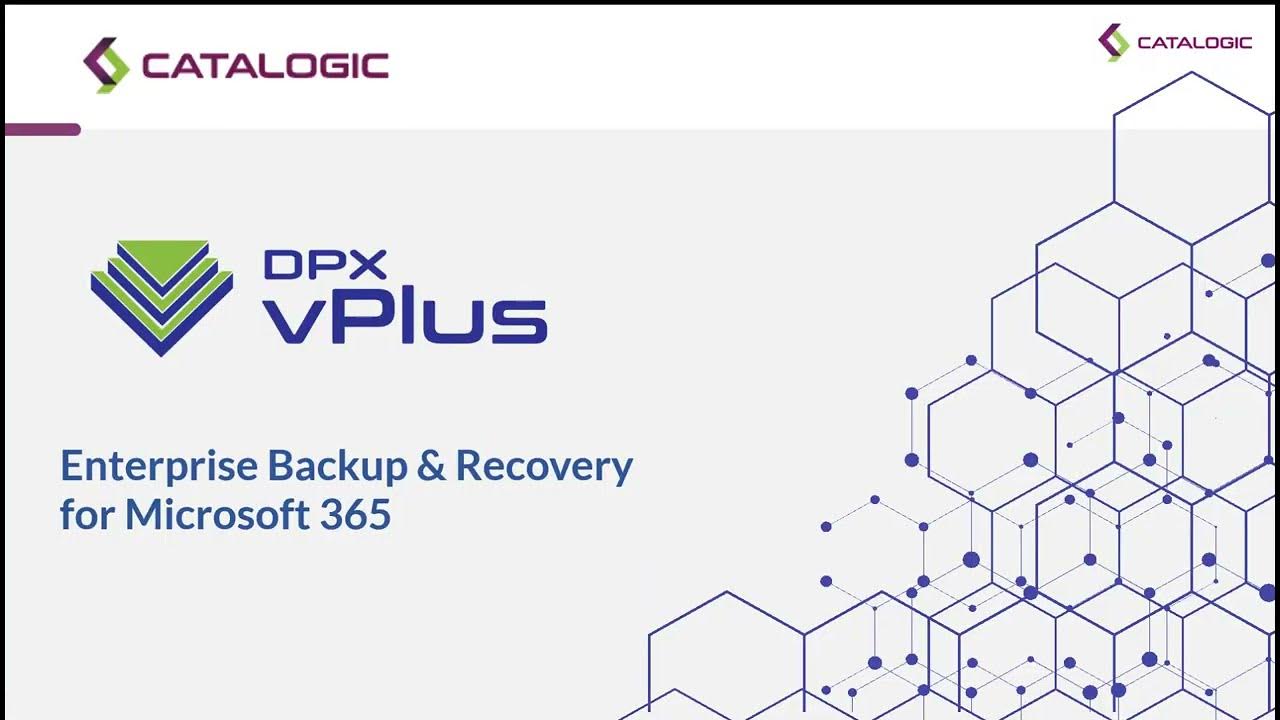Protect Your Microsoft 365 Data with DPX vPlus

We live in a world where data is the new oil. Not only is data valuable for you to maintain and run your business, but if you do not have a plan for data backup and recovery, we can end up paying a high price for it. According to a study by Touche Ross, 90% of businesses without a disaster recovery plan, will fail after a disaster. Meanwhile, more and more critical organizational data is being created, stored, and shared outside of the data center. Oftentimes, this is close to or over 50% of organizational data. This data lives on laptops, tablets, mobile devices and in cloud services, like Microsoft 365. And yet this data can very easily be lost and lost for good without proper Microsoft 365 backup.
Being a SaaS productivity app, Microsoft 365 makes a lot of sense in today’s mobile world. Easy access to documents through the cloud, improved collaboration on project using SharePoint and Teams, and its overall flexibility are just a few of the reasons why adoption of Microsoft 365 continues to rise year after year. However, many organizations believe that moving data to a cloud-based SaaS solution means that data backup is no longer needed – that the provider takes on the responsibility to protect the data. According to a recent Enterprise Strategy Group report, one in four businesses don’t believe they need Microsoft 365 backup. But this is simply not the case, including Sharepoint backup and OneDrive backup.
Microsoft provides what some describe as marginal efforts to protect and backup data, but it does not guarantee complete and fast restores of deleted or corrupted Microsoft 365 data. To put it simply, Microsoft ensures that it won’t lose your data. However, the company doesn’t make any guarantees about recovering it for you. This means that the majority of the burden is placed on the customer.
Now if Microsoft 365 ensures that it won’t lose your data, you may be asking why you would ever need to worry about recovering your data? The answer is that Microsoft’s promises are limited to protection against loss of service due to hardware failure or natural disaster, and short-term protection following user- or admin-error. This means that there are several examples where data loss can occur outside these two areas.
- Recovering an email or file that was deleted a long time ago: Microsoft has a 93-day retention policy for both its first and second recycling bins. This means that if a file or email has been deleted for more than 93 days, this file is permanently deleted from that recycling bin and cannot be recovered by Microsoft.
- Human Error: This can include any actions like accidently or intentionally deleting important emails or files. Perhaps an employee leaves the company and deletes the contents of his/her mail, attachments, documents, etc. This is especially important when using OneDrive. If a user deletes or modifies a file on their local device, that change, or deletion, is automatically synced with all connected devices.
- Ransomware or Malware Attacks: A malware infection, or a ransomware attack can lead to encryption or deletion of your data in Microsoft 365.
With all that in mind, it is essential that you have a third-party Microsoft 365 backup provider to protect against accidental or malicious file deletion, other user errors, ransomware, and data corruption. That is where DPX vPlus for Microsoft 365 backup comes in. Watch this short pre-recorded demonstration of how DPX vPlus provides Microsoft 365 backup and recovery, including Sharepoint backup and Teams backup
DPX vPlus is a Microsoft 365 backup and recovery solution for SharePoint, Exchange, OneDrive, and Teams. It provides the ability for granular backup and recovery of all aspects of the Microsoft 365 suite. This means that if an email, contact, calendar item or file is accidentally deleted, modified, or lost, that data can be recovered to its original location, to an alternate user in the cloud, or downloaded locally. A modern, web-based user interface makes administration and backup scheduling simple and efficient. Deduplication, compression and encryption (in transit and at rest), ensures that your data is not only protected, but limits storage requirements and provides a scalable architecture. When it comes to storage of the backup data, vPlus offers two options. First, a customer can back up to a local file system on the vPlus appliance, or a mounted CIFS or NFS share. Or, if you prefer to keep the cloud data in the cloud, vPlus can even store their Microsoft 365 backup data in an object storage destination like, Azure Blob or AWS S3.
If you would like to learn more about DPX vPlus for Microsoft 365, you can request a live demo or even get a 30-day trial copy to try it for yourself. We’ll be happy to help you set things up.


